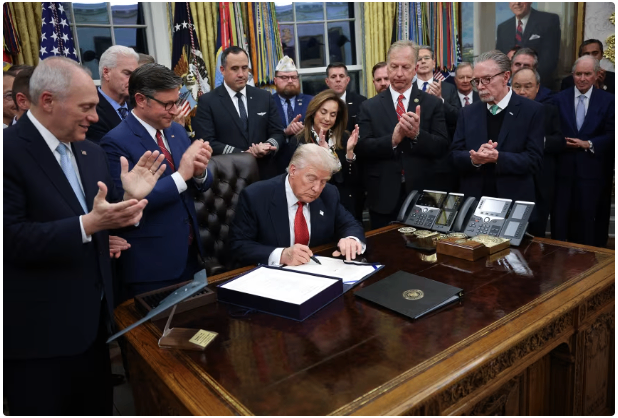TL;DR
-
President Donald Trump signs a funding bill ending the 43-day government shutdown.
-
The deal funds federal operations until Jan. 30, buying time for a broader fiscal agreement.
-
Agencies like the SEC and CFTC can now resume crypto-related operations.
-
The stablecoin-focused GENIUS Act review will continue under the Treasury.
-
Crypto markets remain flat despite the political breakthrough.
Shutdown Ends After Record 43 Days. The longest government shutdown in U.S. history officially ended this week after President Donald Trump signed a funding bill approved by both chambers of Congress. The bill, which passed the Senate on Monday and cleared the House on Wednesday, restores federal operations until Jan. 30. The move ends a 43-day standoff that saw hundreds of thousands of government employees furloughed and several agencies operating in limited capacity.
Healthcare funding proved to be the final sticking point in negotiations, with Democrats pushing to increase support while Republicans sought to address it later. After signing the bill, Trump suggested he was open to bipartisan collaboration moving forward.

The funding package is a temporary measure, designed to prevent another shutdown while lawmakers negotiate a more comprehensive fiscal plan that covers the remainder of 2026.
Political Fatigue Meets Economic Urgency
This latest shutdown - the third in four years - exposed growing fatigue in Washington over repeated funding standoffs. Political analysts say both parties were motivated to avoid further economic drag, especially given the pressure on small businesses and markets that depend on federal continuity.
During the shutdown, several major government services were disrupted, including tax processing, environmental permitting, and portions of the Treasury's regulatory functions. The economic toll is estimated in the billions, with the U.S. Office of Management and Budget warning that extended disruptions could affect GDP growth for the quarter.
Despite the dysfunction, the eventual deal signals a return to political pragmatism. Trump's decision to sign the bill quickly after House passage suggests the administration is eager to restore federal momentum - particularly as the 2026 budget cycle looms.
Crypto Agencies Back Online
For the crypto sector, the reopening of the government has a direct impact. Agencies like the Securities and Exchange Commission (SEC) and Commodity Futures Trading Commission (CFTC) - both key to regulating digital assets - are now back in full operation. Dozens of pending spot crypto exchange-traded fund (ETF) applications have been in limbo while the SEC operated under limited staff. The resumption of normal operations means analysts can expect review cycles to restart, potentially clearing the way for long-awaited ETF approvals.
Meanwhile, the CFTC can now move forward with its November 19 confirmation hearing for Mike Selig, Trump's nominee to lead the agency. Selig, a former legal adviser known for his open stance toward crypto derivatives, is expected to bring new energy to the CFTC's oversight strategy. Both developments could shape the next phase of institutional crypto growth - especially as traditional financial firms look for clearer rules to launch compliant products.
GENIUS Act and Stablecoin Oversight Resume
The Treasury Department is also expected to resume its analysis of the GENIUS Act, a landmark stablecoin framework aimed at regulating fiat-backed tokens and algorithmic issuers.
The public comment period for the bill ran from early October to early November but was interrupted as parts of the Treasury workforce were furloughed. With the government reopened, the department can now sift through the responses and begin drafting follow-up guidance. The GENIUS Act represents one of the most comprehensive efforts yet to bring stablecoin issuers under federal oversight, including reserve audits, redemption rights, and risk management standards.
Market observers see the reopening as a positive step for the industry. "Every day of delay means projects and investors are left in regulatory uncertainty," said one crypto policy analyst. "This bill's review could finally give the stablecoin sector a workable path forward."
Why It Matters
The end of the shutdown offers more than a bureaucratic reset - it restores momentum in sectors that rely on regulatory clarity. For crypto, this means progress on ETF filings, stablecoin policy, and oversight of exchanges that had been effectively paused.
While the political divide over spending remains, both parties appear to recognize the economic stakes of another deadlock. Trump's willingness to engage with Democrats on healthcare - a rare bipartisan signal - may also extend to fiscal cooperation around emerging financial technology.
As the U.S. rebuilds operational rhythm, investors and policymakers alike are watching to see if the country's renewed stability translates into market confidence.
Final Thought
The 43-day shutdown may have tested Washington's patience, but its resolution reopens the door for long-stalled crypto policy. With agencies returning to work and the GENIUS Act back on track, November could mark the month when U.S. digital asset regulation regains its footing.
Still, lasting progress depends on more than reopened offices. It requires political will - and a shared understanding that the next generation of finance can't wait for the next funding fight.
READ MORE : What is COTI V2: Revolutionizing Blockchain Privacy with Garbled Circuits










